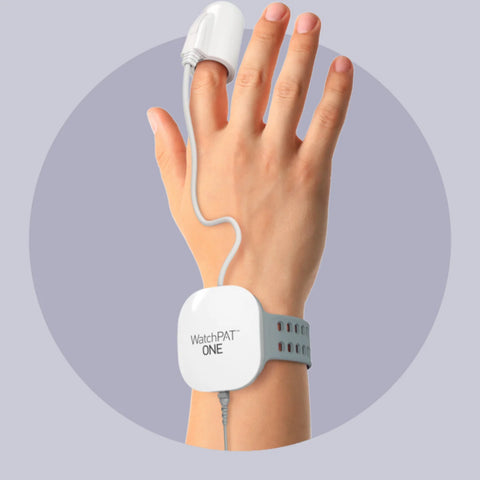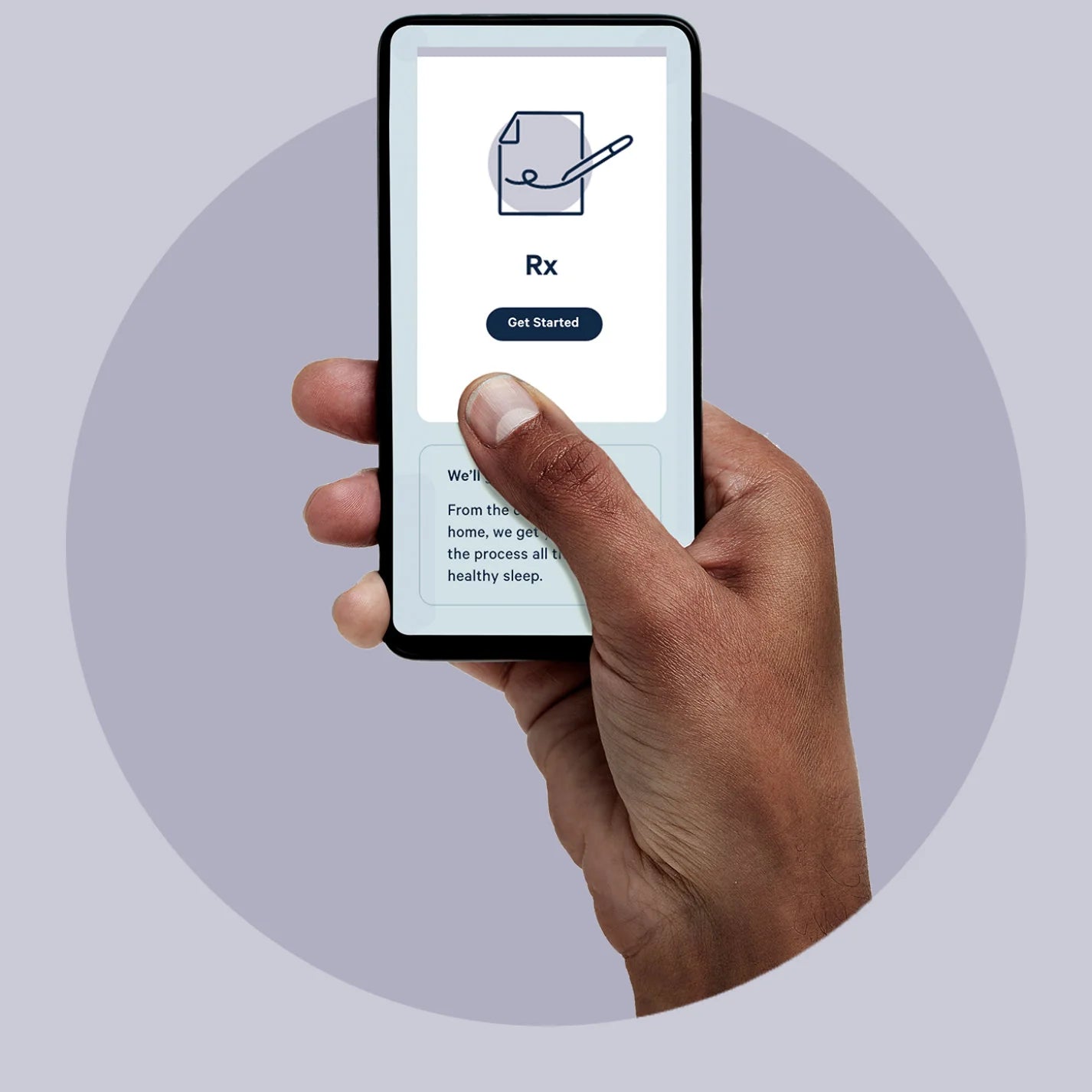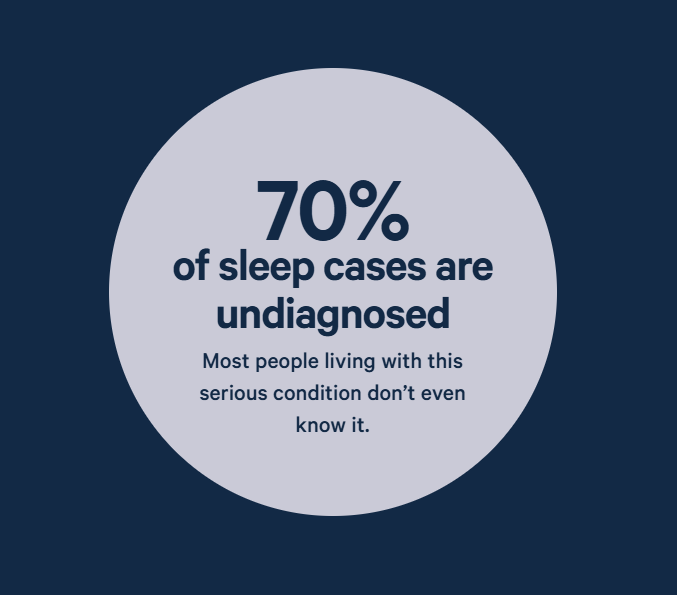Sleep Testing Made Simple.
★★★★★
“I found this test to be easy to perform. I’m one step away from treating my sleep apnea within weeks, not months.”
White Aspects Home Sleep Study With Everything You Need.

The easy-to-use, FDA-approved WatchPAT™ One from Itamar Medicalcan give a full picture of your sleep health in one night.
Product Description
- The WatchPAT™ One is an FDA and DOT approved portable sleep apnea diagnostic device. Its innovative technology ensures the accurate screening, detection, and follow-up treatment of sleep apnea.
- Accurately measures for sleep apnea based on up to 7 different factors: PAT signal (peripheral arterial tone), heart rate, oximetry (blood oxygen level), actigraphy (gross motor activity), body position, snoring, and chest motion.
- Measures true sleep time, sleep architecture, and central sleep apnea.
- Validated against standard polysomnography (PSG).
- Download the WatchPAT™ One app on Google Play or Apple App Store for instructions about how to apply the sensors.
Comfortable Fit
- The portable monitoring device fits like a wristwatch.
- Three points of contact: wrist, finger, and neck.
- No nasal tube or uncomfortable body strap is required.
- CPAP testing is done in the comfort of your home, the environment that best reflects your natural sleep patterns.
- Sleep study test completed in one night of sleep.
Who It’s For
- Individuals who suspect they may have sleep apnea but prefer to avoid an overnight stay in a sleep lab.
- Adults aged 18 and above.
- Those experiencing unexplained symptoms such as loud snoring, frequent nighttime awakenings, daytime fatigue, or difficulty concentrating.
- People who are awaiting a formal diagnosis but face delays due to limited availability at sleep centers.
What’s Included
The home sleep apnea test kit includes:
- WatchPAT™ One wrist-worn device
- WatchPAT™ One chest sensor
- WatchPAT™ One finger probe
Specifications
- Price: 1000 AED
- Tests For: Obstructive sleep apnea (OSA)
- Accuracy: WatchPAT™ One is clinically validated with an 89% correlation to PSG5.
- Success Rate: 98% success. A less than 2% rate of failure can occur during data acquisition and analysis.
Support
- WatchPAT™ One How to use video, manuals, care instruction, and detail on your personal sleep report are available.
- If diagnosed, We guide your apnea treatment, setting you up for consistent sleep success.
A Comprehensive & Personalized Sleep Report For You
The Right Here, Right Now Rx.
If you receive a sleep apnea diagnosis, you’ll have the doctor’s CPAP prescription for sleep apnea therapy instantly. Starting treatment is just a few clicks away.

Chat or call now to go over any questions you have about the at-home sleep test.

A Sleep Test Could Save Your Life.
Sleep apnea can lead to many serious health conditions. Reduce the risk of heart disease, stroke, depression, and other health risks by getting tested and treated as soon as you can.
The Easy Alternative To Sleep Labs.
Understanding The Home Sleep Test
What if I can’t sleep during a sleep study?
Sometimes sleep studies cause just enough anxiety that it makes proper sleep feel hard for the participant.
That said, in most cases, the home sleep test device can get enough information for conclusive results, even if your sleep feels “bothered”.
If you really can’t sleep (less than 2.5 hours of sleep), you may need to retake the sleep test.
How does a home sleep study work?
Home sleep studies use a collection of sensors to track key metrics related to how your body functions during sleep, airflow, breathing, heart rate, and body position.
The Itamar WatchPAT™ One uses a wrist sensor, pulse oximeter, and chest sensor to track data in 7 areas related to sleep wellness: Apnea events (central and obstructive), true sleep time, snoring and breathing patterns, oxygen saturation, heart rate, sleep stages, and body position.
This gives a total view of your sleep health and what may be disrupting it.
How to get tested for sleep apnea?
If you suspect you have sleep apnea, you have two basic options for testing.
Traditionally, studies were conducted in a sleep lab over one to two nights. However, technology has provided a simpler alternative: the at-home sleep study. Either test to detect sleep apnea requires a prescription from a physician before you can take it.
Can you take a sleep apnea test at home?
Sleep apnea can be diagnosed through a home sleep test. These tests can provide sufficient data for a positive diagnosis in just one night of sleep.
The sensor data is sent directly to a sleep physician from your cell phone’s Bluetooth. Home sleep tests will help to diagnose sleep apnea, but may not provide enough data for other sleep order diagnoses such as restless leg syndrome or narcolepsy.
What is a sleep study used for?
A sleep study is performed to diagnose sleep apnea, and other breathing conditions that can disrupt someone’s sleep and overall health.
Do you need a prescription for a sleep apnea machine?
You cannot get a CPAP without a prescription., a CPAP machine is a federally regulated medical device that requires a prescription. The way to obtain one is to complete a sleep study, which can be done at home or at a sleep lab.
How accurate are home sleep apnea tests?
The accuracy of home sleep apnea tests ranges widely, between 68% and 91%. The accuracy depends on the type of device used and whether you are at high or low risk for having sleep apnea. The tests are significantly more accurate for people at a higher risk.
How many times can I take an at-home sleep apnea test?
Experts recommend that home sleep apnea tests be taken only once. If the results are inconclusive or negative, your doctor may instruct you to do a polysomnography in a sleep lab to ensure accurate results.
What sleep disorders can home sleep apnea tests detect?
Currently, at-home sleep tests are capable of testing for obstructive sleep apnea and central sleep apnea. These tests are recommended only for people with moderate to severe obstructive sleep apnea symptoms. Those with a history of cardiorespiratory diseases, stroke, insomnia, or hypoventilation should do their sleep study in a lab and not conduct an at-home sleep test.
Will insurance pay for home sleep apnea studies?
Aspects does not work with insurance companies. Any reimbursement will be at the discretion of the insurance company. If you plan to submit the expense or the results of a Home Sleep Test to an insurance company, you should consult with your insurance company before purchasing the test.
What do home sleep tests measure?
Home sleep tests measure important factors of sleep wellness, such as breathing patterns, body position, and heart rate. Data collected from a home sleep test is analyzed by a doctor to diagnose OSA.
When is a home sleep apnea test appropriate?
A home CPAP test is recommended for people who:
- suspect they have moderate to severe OSA
- are at higher risk for OSA
- prefer a cheaper, more comfortable alternative to in-lab testing
An in-lab test, the alternative to a home sleep test, is recommended for people who:
- suspect their sleep issues are related to sleep disorders other than OSA
- have a history of cardiorespiratory diseases, stroke, insomnia, or hypoventilation
How does a home sleep study diagnose obstructive sleep apnea?
During your home sleep apnea test, you will wear a portable device that tracks important metrics related to your sleep health. Your sleep study results will automatically be shared with your doctor through your cell phone’s Bluetooth. Once your doctor has reviewed your overnight sleep data, they will confirm a diagnosis and, if diagnosed, a treatment plan for OSA.
How to prepare for a sleep study at home?
Follow your normal day and sleep routine. In addition, follow the below guidelines on the day of your test:
- Don’t drink any alcoholic beverages
- Don’t use any sedatives
- Avoid coffee and caffeinated beverages after lunch
- Avoid taking a nap in the afternoon
- Inform your doctor if you take medication
What are the pros and cons of a home sleep study?
Pros:
- Simple and convenient: sleep apnea home testing is more comfortable and easy compared to a traditional sleep lab.
- Affordable: a sleep study test at home is cheaper than an in-clinic sleep apnea test.
- More data collection: Sleep apnea testing at home is possible for longer periods, which is beneficial as the severity of sleep apnea may vary depending on the night. In-clinic studies are done in one night.
Cons:
- Not recommended for everyone: the home sleep test isn’t for children, people with heart issues, or people with mild sleep apnea.
- Less Accurate: less information is captured as there are fewer sensors and recording devices compared to in-clinic sleep apnea tests.
- Potential set-up errors: no technologist observes the setup of the at home sleep study and potential problems with sensors may arise.
How to interpret the home sleep study results?
A clinician will review the test results of the sleep apnea test. The apnea-hypopnea index (AHI) and the respiratory disturbance or respiratory event index (RDI or REI) or the most important items to check. These metrics represent the sleep disruption per hour. An AHI over 5 with symptoms or an AHI over 15 gets diagnosed as OSA.
How much does a sleep apnea test cost?
The home sleep test costs 1200 AED, which is much cheaper than an in-lab sleep test. An in-clinic sleep study can range from 5,000AED to 7,000 AED.
